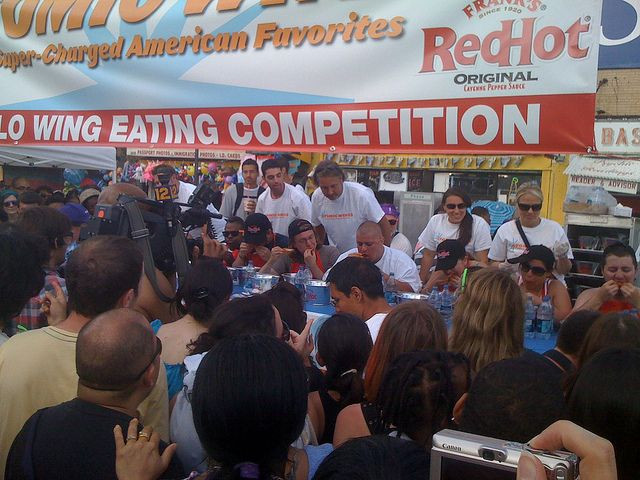Competitive Eater Eric 'Silo' Dahl Gorges His Way Through College: How Safe Is Extreme Eating?

Eric “Silo” Dahl’s freshman fifteen was all business. The 6-foot-3 computer engineering student is currently working his way through college as a nationally ranked competitive eater. Named the third-best “food warrior” in the country by eating authority All Pro Eating, Dahl has so far earned upwards of $18,000 in prize money and merchandise.
"I'm eating for my education," he said, speaking to the Wisconsin State Journal. "It helps me get through."
Dahl stumbled into the world of competitive eating in 2011, when he signed up for a local food challenge at Big Red’s Steakhouse in Madison, Wis. The task was simple: eat a three-pound cheesesteak in less than 10 minutes and skip the bill. Dahl finished the seemingly herculean task with nearly five minutes remaining.
“It just started rolling from there,” said Dahl, who finds the competitive eating world similar to that of professional wrestling. “I really get pumped when the crowd starts cheering. I’m friends with other competitive eaters, but once I’m on stage I don’t have any friends.”
Since his five-minute feat at the Madison steakhouse, the 220-pound college senior has raked in thousands of dollars in winnings and consistently ranked among the nation’s top eaters. He earned his first paycheck at Dickey’s Barbecue Pit in suburban Minneapolis, where he took home $250 after destroying nine pulled-pork sandwiches in six minutes. At the 2012 California State Fair, he was awarded $2,500 after he ate 20 extra-large corndogs in eight minutes.
Competitive eating is not without its critics. In a slew of medical reports, physicians and researchers have called attention to the health risks attending the contestants’ extreme eating habits. Marc Levine, chief of gastrointestinal radiology at the University of Pennsylvania Perelman School of Medicine, says that the activity puts participants at risk of developing obesity, chronic nausea, and gastroparesis.
"I really worry that it's playing with fire a little bit," he said, speaking to US News. "You're playing with your GI tract here. You're using it in ways that it's not intended."
That said, Major League Eating representatives maintain that the purported health risks have never been observed. Chairman George Shea said that when it comes to health risks, competitive eating is just like any other sport.
“There’s a small risk in competitive eating, but I think it is much smaller than in other sports,” he told The Wall Street Journal. “If you compare that to motocross, NASCAR or football, our risk would be marginal in comparison. Are we a greater risk than ping pong? I would say yes.”



























